Explore the depths of divine promises with a Covenant Keeping God in the Bible, and uncover how ancient covenants shape faith today.
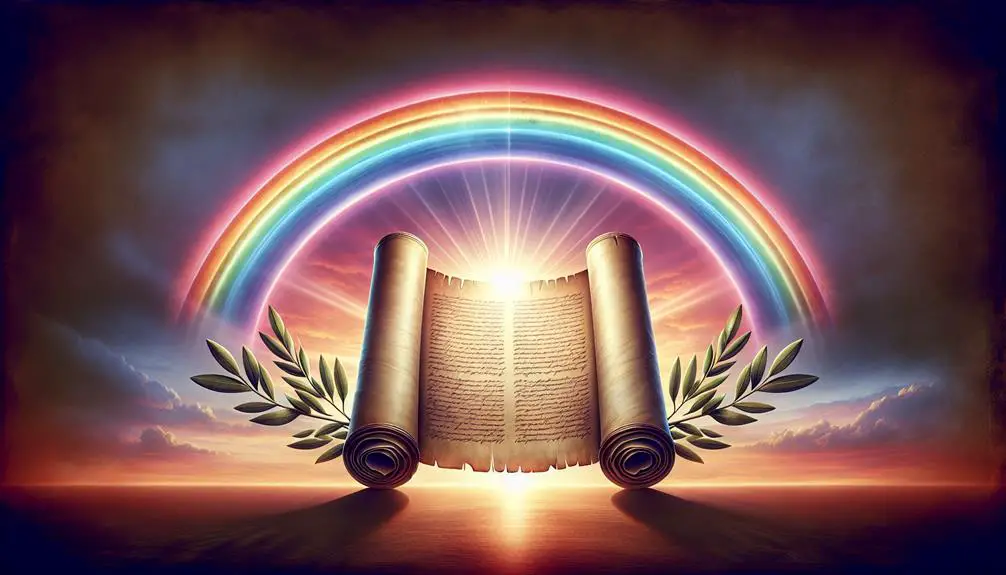
Covenant Keeping God in the Bible
In the grand epic that's the Bible, God apparently didn't have enough to do and decided making covenants was the new hobby to pursue.
You've likely heard snippets about Noah's ark or the promises made to Abraham, but have you ever stopped to think about the sheer depth and breadth of these divine agreements?
These aren't just ancient texts gathering dust; they're testimonies of a covenant-keeping God whose commitment spans centuries.
If you're curious about how these ancient promises influence modern faith and what they say about God's character, there's a rich tapestry waiting to be explored further.
Key Takeaways
- The Bible showcases God's unwavering faithfulness through various covenants with humanity.
- God's promises transcend time, affirming commitment through Noah's rainbow and Abraham's descendants.
- The Sinai and Davidic covenants highlight God's expectation of loyalty and the promise of an everlasting kingdom.
- The New Covenant through Christ emphasizes grace, inclusivity, and the fulfillment of divine promises.
The Concept of Covenant

Throughout history, the concept of covenant has served as a foundational principle in understanding the relational dynamics between God and humanity in the biblical narrative. This concept, deeply rooted in ancient Near Eastern culture, offers a framework for exploring how divine promises and expectations shape the course of human history. Covenant origins trace back to these ancient contexts, where agreements bound kings and subjects, deities and devotees. In the biblical sense, these covenants transcend mere contracts; they embody a profound commitment characterized by loyalty, love, and mutual obligations.
As you delve into the Scriptures, you'll find that covenantal themes aren't static; they evolve, reflecting the dynamic nature of God's relationship with people. This evolution isn't about changing terms but about deepening understanding and expanding the scope of divine-human interaction. Modern interpretations of these covenants seek to unravel the layers of meaning encoded in these ancient texts. Scholars and theologians alike strive to comprehend how these covenants, established millennia ago, continue to inform contemporary faith and practice.
In this light, the study of covenant origins and their unfolding narrative invites you into a deeper exploration of your own faith journey. It challenges you to consider how these ancient agreements influence your understanding of God's character and His promises. Moreover, modern interpretations offer a bridge, connecting ancient truths with contemporary questions, ensuring that the covenantal relationship remains vibrant and relevant in today's world.
Covenant With Noah
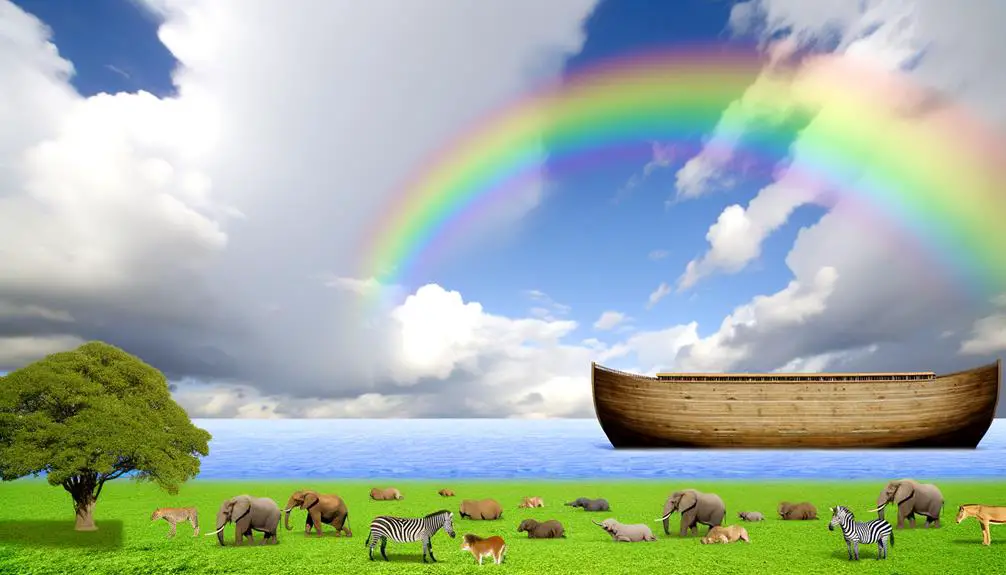
As you explore the covenant with Noah, you encounter a multifaceted symbol of divine commitment and human resilience.
The rainbow emerges as a sign of God's promise not to destroy the earth again by flood, symbolizing a bridge between the divine and humanity.
Meanwhile, Noah's Ark represents the means of survival and the possibility of a renewed humanity, setting the stage for a fresh start in the narrative of divine-human relations.
Rainbow: Divine Promise Sign
The biblical narrative vividly depicts the rainbow as a divine symbol of God's covenant with Noah, signifying an eternal promise that never again would a flood destroy the earth. This assurance transcends mere meteorological phenomena, embedding itself in various cultural interpretations as a sign of hope and renewal.
- Universality: The rainbow appears across cultures as a sign of divine promise or intervention.
- Meteorological Significance: Beyond its scientific explanation, the rainbow holds a deeper, spiritual meaning.
- Symbol of Peace: Often seen as a bridge between heaven and earth, symbolizing peace.
- Renewal and Hope: Represents a fresh start and the faithfulness of God's promises.
This covenant highlights the intricate relationship between divine assurances and natural occurrences, enriching our understanding of faith and the natural world.
Noah's Ark: Survival Vessel
In biblical lore, God's covenant with Noah materializes through the construction of an ark, a survival vessel designed to safeguard human and animal life from a cataclysmic flood. This divine directive not only signifies God's intention to preserve life but also establishes a framework for humanity's obedience and faithfulness.
The ark, constructed with specific construction materials like gopher wood and sealed with pitch, becomes a tangible representation of God's mercy and providence. The directive to bring animal pairs into the ark underscores a commitment to biodiversity, ensuring the continuation of species post-flood.
This meticulous planning and execution reflect a divine strategy, blending salvation with sustainability. The ark's story, then, isn't just about survival but about a covenantal relationship between God, humanity, and the natural world.
Humanity's Fresh Start
Following the deluge that cleansed the earth, God's covenant with Noah offered humanity a fresh start, embodying a promise of regeneration and divine fidelity. This pivotal moment not only signified a population rebirth but also underscored the importance of environmental stewardship as a divine mandate. Here's why this covenant is crucial:
- It symbolizes a second chance for humanity, emphasizing mercy and hope.
- Marks the beginning of a new relationship between the divine and all living creatures.
- Sets the stage for future covenants, illustrating a pattern of divine commitment and human responsibility.
- Highlights environmental stewardship as a key component of divine-human relations, urging us to respect and protect our world.
This covenant, therefore, is a foundational element in understanding God's enduring promise of renewal and care for both humanity and the earth.
Promises to Abraham

Exploring the promises to Abraham reveals the foundational role these covenants play in understanding divine fidelity and human history within biblical narratives. You'll see that through Abraham's journey, a narrative unfolds that is rich in faith, trials, and divine promises. The laughter of Sarah, initially a response of disbelief, eventually turns into joy, symbolizing the fulfillment of what seems impossible through faith.
The promises made to Abraham are multifaceted, encompassing land, descendants, and a relationship with God that is both personal and communal. These aspects are not just historical footnotes but are central to understanding the trajectory of biblical faith.
Aspect of Promise |
Description |
|---|---|
Land |
Abraham is promised a land for his descendants, marking the beginning of a profound relationship with a physical place that is both literal and symbolic. |
Descendants |
Despite Sarah's initial laughter and doubt, the promise of countless descendants becomes a cornerstone of faith, illustrating the miraculous power of God's promises. |
Blessing |
Abraham's family is to become a source of blessing for all nations, expanding the covenant beyond individual or tribal confines. |
Relationship with God |
The covenant establishes a unique relationship between Abraham's lineage and God, characterized by guidance, protection, and direct communication. |
Test of Faith |
Abraham's willingness to sacrifice Isaac, though halted by God, demonstrates the depth of faith and commitment required in this covenantal relationship. |
Analyzing these promises, you grasp the depth of commitment and faith inherent in Abraham's story. It's a narrative that challenges you to understand the complexities of divine-human relationships and the enduring nature of faith.
Moses and the Sinai Covenant

You'll find that the Sinai Covenant marks a pivotal moment in biblical history, establishing a foundational relationship between God and the Israelites.
Moses plays a critical role, not just as a mediator but as a key figure in defining the covenant's terms and ensuring their transmission to the people.
Understanding the covenant's specifics sheds light on its significance and the expectations placed upon the Israelites, highlighting the depth of their commitment to God.
Sinai Covenant Overview
At the heart of the Sinai Covenant, brokered by Moses between God and the Israelites, lies a pivotal moment in biblical history, encapsulating God's laws and expectations for His chosen people. This covenant's significance is multi-faceted, deeply impacting the faith narrative.
- Mountain encounter: A divine revelation where God's presence is manifest, setting the stage for the delivery of the covenant.
- Law tablets: The physical embodiment of the covenant, comprising commandments fundamental to Israelite identity and ethics.
- Moral framework: Establishes a set of moral and social guidelines that underline a communal relationship with God.
- Exclusive worship: Commands the Israelites' loyalty and worship exclusively to God, establishing a foundation for monotheism.
This covenant not only defines the Israelites' relationship with God but also outlines their societal structure and ethical standards.
Moses' Role Highlighted
Central to the Sinai Covenant's establishment stands Moses, who served as the intermediary between God and the Israelites, a role that underscored his significant influence on this foundational agreement. His encounter with the Divine at the burning bush marks the commencement of his pivotal mission.
This event wasn't merely an epiphany but a call to action, signaling the beginning of a series of events that would redefine the Israelite identity. The plague narratives further highlight Moses' instrumental role. Each plague, meticulously documented, not only exhibits the divine power but also Moses' unwavering faith and leadership.
Through these narratives, Moses emerges not just as a messenger but as a testament to the resilience and faith necessary to uphold the covenantal relationship with God.
Covenant Terms Explained
Having explored Moses' critical role in the establishment of the Sinai Covenant, let's now examine the specific terms that defined this foundational agreement between God and the Israelites. The covenant conditions weren't only spiritual milestones but also had profound modern parallels, demonstrating the timeless relevance of these divine stipulations.
- Exclusive Worship: Just as God demanded undivided devotion, today's principle of commitment reflects in personal and communal relationships.
- Moral and Ethical Conduct: The commandments laid down a framework for integrity and justice, principles still vital in contemporary society.
- Ceremonial Observances: These rituals signified identity and remembrance, similar to how modern traditions preserve cultural heritage.
- Social Justice: The emphasis on caring for the vulnerable mirrors current advocacies for equality and human rights.
These elements underscore the covenant's enduring legacy, bridging ancient directives with current ethical standards.
Davidic Covenant Explained
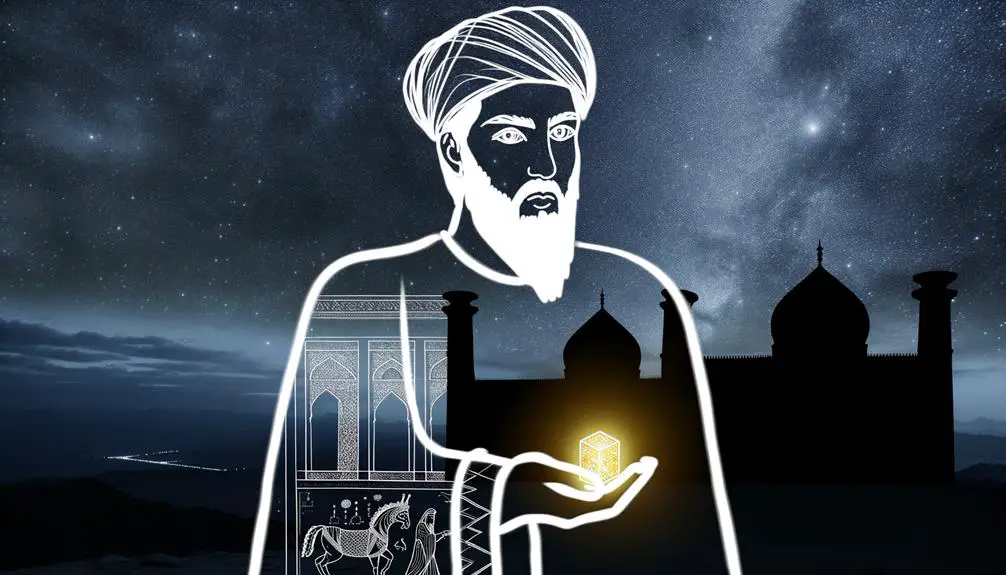
Why does the Davidic Covenant hold such a significant place in biblical theology, and how does it promise an everlasting kingdom through David's lineage?
At its core, the Davidic Covenant, found primarily in 2 Samuel 7, establishes a foundational prophecy and promise directly from God to King David. It's a pivotal moment where God commits to establishing David's throne forever, highlighting the eternal nature of His covenant with Israel through David's lineage.
This covenant isn't merely about political sovereignty or territorial dominion. It's deeply spiritual, promising that David's lineage would have a lasting impact on humanity's spiritual journey towards God. Solomon's succession and the building of the Temple are immediate fulfillments of this covenant. Solomon, David's son, not only inherits the throne but also undertakes the significant task of building the Temple in Jerusalem. This Temple becomes the physical and spiritual center for the worship of Yahweh, symbolizing God's dwelling among His people and His unbroken relationship with them. The Temple's significance extends beyond a mere architectural achievement; it represents the fulfillment of God's promise to David and signifies a sacred space where heaven and earth intersect.
Thus, the Davidic Covenant encapsulates the hope of an everlasting kingdom, rooted in divine promise and human responsibility. It sets the stage for the ultimate fulfillment of God's plan for redemption and the establishment of an eternal kingdom through the lineage of David, pointing believers toward the future messianic hope.
Prophetic Insights on Covenant
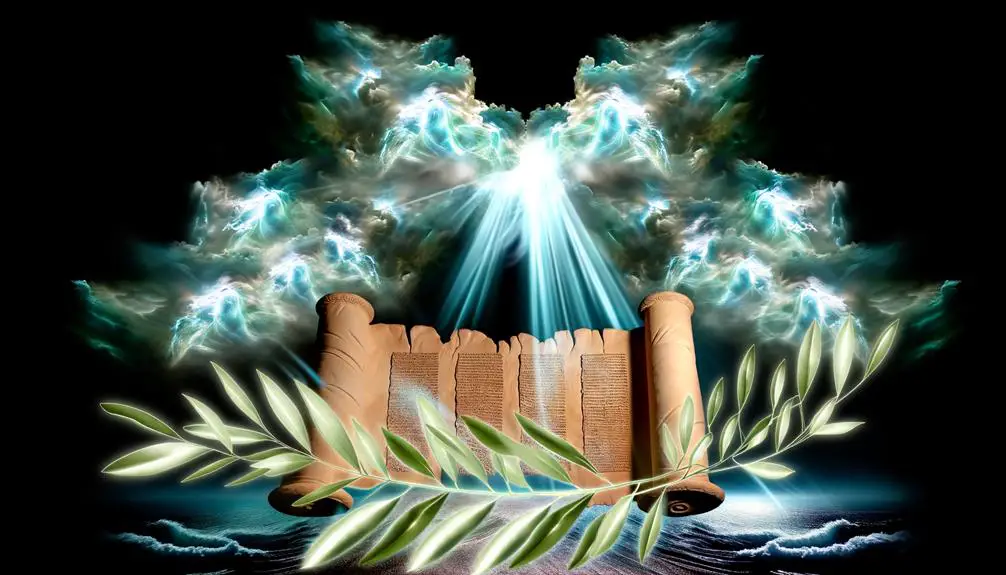
In exploring the prophetic insights on covenant, it's crucial to recognize how these revelations illuminate God's unwavering commitment to His promises throughout biblical history. Prophets, as God's mouthpieces, often referred to covenant rituals to remind the Israelites of their sacred obligations and the blessings tied to their faithfulness. These insights not only underscored the seriousness of the covenant but also highlighted its ongoing relevance.
To truly grasp the depth of these prophetic messages, consider the following aspects:
- The role of prophets in renewing the covenant: Prophets like Isaiah and Jeremiah played pivotal roles in calling the people back to covenant faithfulness, especially during times of apostasy.
- Covenant rituals as symbols of God's grace: Rituals such as circumcision and Passover weren't mere formalities but tangible signs of God's grace and promises to His people.
- Warnings against covenant breach: Prophetic warnings served as stark reminders of the consequences of forsaking the covenant, emphasizing the need for repentance and spiritual renewal.
- Modern relevance of prophetic insights: These insights challenge believers today to reflect on their commitment to God's covenant, encouraging a life of faithfulness and devotion.
Understanding the prophetic insights on covenant deepens one's appreciation for the intricate relationship between God and His people. It's a reminder that the covenant isn't just a historical artifact; its principles and promises remain vitally relevant, guiding believers in their spiritual journey. As you delve into these insights, you're invited to reflect on the enduring nature of God's promises and the significance of living in covenant with Him.
The New Covenant in Christ

Through the life, death, and resurrection of Jesus Christ, God established the New Covenant, significantly transforming the way believers engage with divine promises and obligations. This pivotal moment in biblical history not only fulfilled ancient prophecies but also introduced a paradigm shift in the relationship between God and humanity. The New Covenant is marked by its grace emphasis and the inclusion of Gentiles, breaking down the barriers that previously segregated God's chosen people from the rest of the world.
Aspect |
Old Covenant |
New Covenant |
|---|---|---|
Basis |
Law |
Grace |
Scope |
Israel |
All nations |
Access |
Priests |
Jesus Christ |
Promise |
Land, nation |
Eternal life |
Under the New Covenant, the emphasis on grace over legalistic observance of the law offers believers a profound sense of freedom and assurance in their relationship with God. This grace is not a license for moral laxity but an empowerment to live righteously, motivated by love rather than fear of punishment.
Gentile inclusion underlines God's universal love and the fulfillment of His promise to bless all nations through Abraham's seed. This inclusion is a testament to the expansiveness of God's mercy, reaching beyond ethnic and cultural boundaries to embrace all of humanity.
God's Faithfulness Illustrated

Reflecting on biblical narratives, it's evident that God's faithfulness remains a cornerstone, unwavering across generations and circumstances. This divine loyalty presents itself as a beacon of hope, illustrating an unparalleled trustworthiness testimony that's both profound and personal. As you delve into the scriptures, you're met with countless demonstrations of God's steadfast commitment to His people, each account a testament to His unchanging nature.
To deepen your understanding, consider these examples:
- The Promise to Abraham: God's covenant with Abraham wasn't just a promise; it was a declaration of divine loyalty. Despite Abraham's advanced age and Sarah's barrenness, God fulfilled His promise, showcasing His faithfulness across decades.
- The Exodus: In liberating the Israelites from Egyptian bondage, God demonstrated His power and commitment to His covenant. This event isn't merely a historical account; it's a narrative saturated with the trustworthiness of God's word.
- The Davidic Covenant: Through His covenant with David, God illustrated His long-term faithfulness, promising that David's lineage would endure forever. This pledge finds its ultimate fulfillment in the birth of Jesus Christ, affirming God's steadfast loyalty.
- The New Covenant through Christ: The establishment of a new covenant through Jesus is perhaps the clearest demonstration of God's faithfulness. It's a fulfillment of ancient promises and a foundation for all believers, signifying an everlasting covenant sealed by divine love and grace.
These narratives not only enrich your faith journey but also underscore the relentless nature of God's faithfulness. His divine loyalty and trustworthiness testimony resonate through every page of scripture, offering assurance and hope to all who believe.
Frequently Asked Questions
How Do Covenants in the Bible Reflect the Cultural and Legal Practices of Ancient Near Eastern Societies?
You'll find that covenants in the Bible mirror ancient contracts and societal norms of Near Eastern societies. These agreements weren't just religious; they were deeply embedded in the culture and legal systems of the time.
They often involved mutual obligations and benefits, reflecting a structured approach to relationships and transactions. Through this lens, biblical covenants offer a fascinating glimpse into how ancient peoples navigated their world, blending the divine with the everyday.
In What Ways Have Modern Theologians and Scholars Reinterpreted Biblical Covenants in Light of Contemporary Issues Such as Social Justice, Environmental Stewardship, and Global Peace?
You're exploring how modern theologians and scholars have spun old threads into new tapestries, weaving covenant theology into the fabric of today's challenges.
They've taken biblical covenants, traditionally seen in the light of ancient practices, and reinterpreted them, focusing on contemporary issues like social justice, environmental stewardship, and global peace.
This analytical, scholarly, yet faithful approach reflects a deep engagement with the text, offering fresh perspectives on age-old promises.
Can the Concept of Covenant in the Bible Be Compared to Any Similar Concepts in Other Major World Religions, and if So, How?
Yes, you can compare the Bible's covenant concept to similar ideas in other major world religions through covenant symbolism and religious parallels.
For instance, in Hinduism, the concept of Dharma resembles a covenant, guiding moral and social duties.
Islam's Ummah reflects a community bound by a divine covenant.
These parallels show how religions use covenant-like concepts to forge deep, meaningful connections between the divine and their followers, emphasizing mutual responsibilities and ethical living.
How Have the Interpretations of Biblical Covenants Evolved Throughout Christian History, Particularly During Significant Periods Such as the Reformation and the Modern Era?
You're diving into how understanding of biblical covenants has changed, especially during the Reformation and modern times.
Medieval interpretations often emphasized divine promises as unbreakable, guiding societal norms. However, Enlightenment critiques introduced skepticism, questioning the literal and figurative aspects of these covenants.
This shift led to a broader, more analytical exploration of biblical texts, blending faith with scholarly inquiry to reframe our grasp on these ancient agreements in contemporary Christian thought.
What Role Do Biblical Covenants Play in Interfaith Dialogue, and How Can They Contribute to Mutual Understanding and Respect Among Different Religious Communities?
When you engage in interfaith dialogue, biblical covenants can serve as a bridge. Imagine a discussion between Jewish and Christian leaders, focusing on covenant rituals. Such exchanges can reduce interfaith misunderstandings, fostering mutual respect.
Conclusion
In conclusion, you've journeyed through the biblical landscape, witnessing God's unbreakable bonds from Noah's ark to Christ's cross. These covenants, ancient yet evergreen, showcase God's unwavering faithfulness. Whether it's promising land to Abraham or offering eternal salvation through Jesus, God's commitment transcends time.
Like a divine WiFi, His word connects generations. Analyzing these sacred texts reveals a pattern: God's love and promises aren't just historical footnotes but living, breathing assurances for today and beyond.

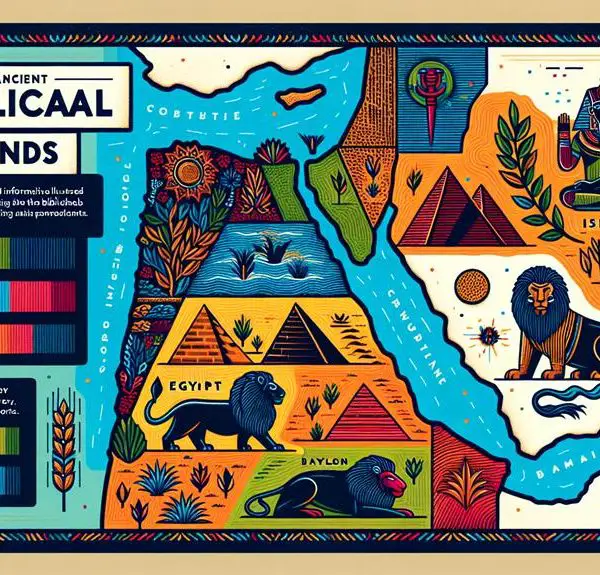

Sign up